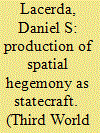| Srl | Item |
| 1 |
ID:
144281


|
|
|
|
|
| Summary/Abstract |
In recent years Brazil has deployed a military takeover of dozens of favelas. Presenting data collected from 2012 to 2014 in one of the favelas, I argue that the process of ‘pacification’ is an attempt at passive revolution, which depends more on manufacturing spatial hegemony through non-military strategies than on the war of manoeuvre that is currently being undertaken. This is developed through an articulation of Gramsci’s theoretical framework with Lefebvre’s perspective of the production of space, which exposes the failure to overcome the fragile presence of state in the territory through everyday state formation.
|
|
|
|
|
|
|
|
|
|
|
|
|
|
|
|
| 2 |
ID:
157947


|
|
|
|
|
| Summary/Abstract |
This article applies Henri Lefebvre’s concept of rhythmanalysis to an exploration of ethnicity in Hong Kong. It argues that rhythmanalysis has tended to be used in social geography, architectural research, and cultural studies and has been overlooked as a methodological tool in regard to ethnicity. An historic narrative of ethnic diversity in Hong Kong is contrasted with contemporary transformations. It is argued that rhythmanalysis presents an alternative perspective that can deepen knowledge about enduring social patterns that serve to contextualise ethnicity and ethnic relations in a given space. In conclusion, it is argued that there is a need for greater recognition of ethnic diversity in Hong Kong as a means to assert a more confident and secure local identity.
|
|
|
|
|
|
|
|
|
|
|
|
|
|
|
|
| 3 |
ID:
161093


|
|
|
|
|
| Summary/Abstract |
This article looks into the meaning of Tahrir Square before, during, and after the January 25 revolution. We employ Lefebvre's conceptual triad of space to understand how space is not merely a physical form, but also the product of relations between natural and social objects in this space. To understand how these relations changed dramatically after January 25, we will draw on Sewell's insight into how space is a constituent aspect of contentious politics. We discuss the way in which the political space of Tahrir Square went through distinct phases during and after the Egyptian revolution, from counter-space, to eventually a change in the conceived space of Tahrir Square, but not according to the principles of the newly created lived space during the 18 days.
|
|
|
|
|
|
|
|
|
|
|
|
|
|
|
|